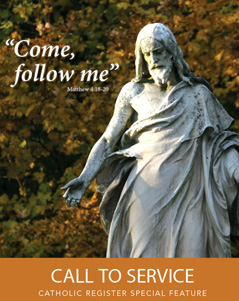“For me it was an opportunity to do ministry in a different context from when I had been doing it before,” said the mother of six and grandmother of seven.
Serving first as a Lieutenant with the Toronto Scottish Regiment, a reserve infantry regiment, Federico quickly developed a reputation for her empathy, personal drive and willingness to share in the experiences of the soldiers.
“At a later stage in life she took this responsible position in an environment that, physically, can be very, very demanding,” said Lt.-Col. Fred Moore, Commanding Officer of the Toronto Scottish who served with Federico as junior officers in the regiment.
“I still remember her on snowshoes during winter exercises trudging up and forward through snow banks and drifts where I was even having trouble. She really upped the profile of women here by her determination.”
But for Federico, sharing the physical hardships of the soldiers was a necessary part of her new ministry.
“I didn’t join the army to sit in an office,” she said. “I thought the only way I could relate to people was being with them and seeing what they did.”
For retired Lt.-Col. Bill Adcock, a veteran of Canada’s peacekeeping operations in the former Yugoslavia and a long-time colleague, the soldier-focused work of chaplains like Federico came at a needed time.
“Back in the 1980s we had chaplains in the reserves but, to be honest, we hardly used them,” he said. “Then we get into the 1990s and we begin to rely heavily on military chaplains to provide emotional support especially to battalions and task forces going overseas. Now, as we have re-evaluated the importance of (post-traumatic stress disorder) and even whether a soldier can go overseas, it is the chaplain who sits down with the individual and evaluates whether or not there is going to be an emotional crisis.”
While most of her service as a military chaplain was done on a part-time basis, Federico, like many reservists, would often volunteer to serve the military on a full-time basis for several months at a time.
One memorable period was 2008-09 when Federico, just retired from the school board, volunteered to serve full-time as Deputy Senior Garrison Chaplain at CFB Petawawa, whose soldiers were frequently being tasked to fight in Afghanistan.
“Deployments are always stressful for families and it was an opportunity to minister to families who were suffering and stressed out,” she said.
Among her responsibilities was giving pre-deployment lectures to assist soldiers in finding spiritual strength to deal with the tasks they were about to undergo.
“Then we did a lot of support with families when they were gone,” she said.
Another important task at Petawawa was assisting families going through marriage problems.
“I did a lot of marriage counselling and a lot of interventions with people who came home on compassionate leave because of marriage problems,” she said. “Other times they came home on leave, found out there was a problem, and then suddenly we are trying to do damage control to decide whether or not they should go back.”
Wishing to continue serving in uniform until the age of 65 if possible, Federico has transferred to the Cadet organization to work with a corps in Brampton, Ont.
(Smol is a freelance writer in Toronto.)
This article is part of our Call to Service special feature.


